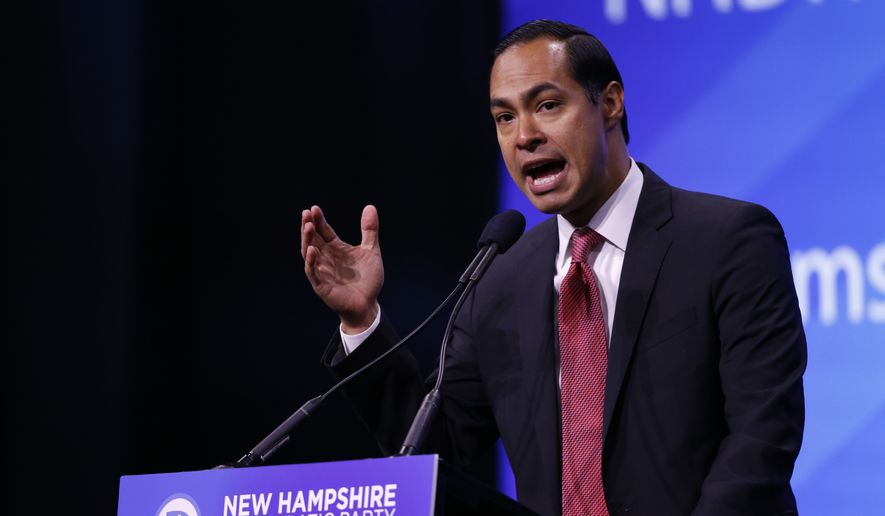HOUSTON — Julián Castro will be the sole Latino and only former mayor from a predominately Hispanic city when the third Democratic presidential debate tees off here Thursday in his home state of Texas.
That up-close and personal view of the immigrant experience has given Mr. Castro, the son of a Chicano activist, some room to run and stand out in a 2020 presidential race that is playing out amid a growing liberal backlash against President Trump’s hard-line immigration policies.
It positioned him for a much-needed break-out moment on the debate stage at Texas Southern University.
“One thing I think Julian Castro has done is that he has helped pull the Democratic field to the left on immigration from where at least some of them were eight or nine months ago,” said Mark P. Jones, a political science professor at Rice University.
“No one is really talking about border security or a compromised balanced approach where some people are deported and some people are not deported,” Mr. Jones said. “Everyone is taking a very sympathetic, almost open borders approach.”
It underscores how Democrats have moved to the left on immigration, while Mr. Trump and Republicans move to the right — setting up a likely flashpoint in the general election.
The 2020 Democrats on Thursday are likely to field questions regarding their plans to stop mass shootings in the wake of deadly shootings in El Paso and Odessa, to reduce greenhouse gases in a city where the fossil fuel industry drives the economy and to expand health care in a state with the most uninsured people in the nation.
Immigration, though, is perhaps the most polarizing issue in the border state of Texas, which is home to a burgeoning Hispanic community and has been ground zero for the implementation of Trump administration policies that have triggered debates over “kids in cages,” restrictions on asylum seekers and whether are not immigrants are more of an asset or a threat to the nation.
Amplifying the issue at the debate will be moderator Jorge Ramos, an anchor for the Spanish-language network Univision who champions for illegal immigrants and is a vocal critic of Mr. Trump’s border policies.
That could provide an opening for Mr. Castro, who is among the lowest polling candidates to qualify for the Houston.
Mr. Castro, 44, a former mayor of San Antonio and secretary of Housing in the Obama administration, has made softening immigration law a cornerstone of his campaign. He was the first major candidate to roll out an immigration plan and upped the ante for his rivals by calling for the decriminalization of border crossings.
The move put him at odds with former Vice President Joseph R. Biden, the undisputed front-runner in the Democratic race.
It also led to a headline-grabbing clash in the June debate when he called out former Rep. Beto O’Rourke, a fellow Texas Democrat, for refusing to adopt his push to do away with Section 1325, an obscure part of the nation’s immigration law that makes jumping the border a misdemeanor punishable by up to six months in jail.
Mr. Castro got a bounce from the performance.
Afterward, a Univision poll found that 65% of registered Hispanic voters said they would be more likely to vote in favor of Democrats that backed Mr. Castro’s stance and that Mr. Castro had the best immigration plan by far.
That helps explain why Mr. O’Rourke went on damage control after the debate, seeking to assure immigration activists that he was on their side by traveling to the southern border.
Mr. Castro continued to rise in another Univision poll released this week that showed he was the top choice of 12% of Hispanic voters nationwide — a third-place finish behind Mr. Biden at 22% and Sen. Bernard Sanders of Vermont at 20%.
“You’ve seen Julian Castro having a good couple of months since the first debate,” Matt Barreto, co-founder of Latino Decisions, said in a conference call this week. “He has continued to campaign very vigorously, so I think his name ID is beginning to increase with Latinos.”
“It will be very important for him in this debate to see if he can continue that, continue that strong performance,” he said.
• Seth McLaughlin reported from Washington.
• Seth McLaughlin can be reached at smclaughlin@washingtontimes.com.
• S.A. Miller can be reached at smiller@washingtontimes.com.




Please read our comment policy before commenting.